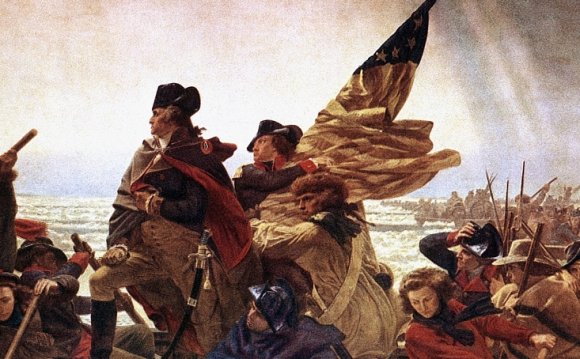
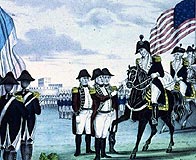
The outset of war
In April 1775 Gage sent a small force to seize patriot militia weapons and gunpowder at Concord, not far from Boston, but his soldiers became involved in a brief firefight on Lexington Green on their way there. This event was reported far and wide, and the first shot fired there has ever since been described as 'the shot heard round the world'.
There was a bigger clash at Concord, and then a fighting retreat, in which the British force was roughly handled. The militias then closed in and blockaded the British in Boston. Although newly arrived British reinforcements, under General William Howe, who was soon to replace Gage, won a costly battle at Bunker Hill, outside Boston, they could not break the siege.
In mid-1775, patriot representatives of the 13 colonies of America, meeting in Philadelphia as the Continental Congress, appointed George Washington, a well-to-do Virginia landowner, as commander in chief of its military forces. Washington, who thought militias fundamentally unreliable, set about raising a regular force, the Continental Army, and as the initial skirmishes between the patriots on the one hand and the British and their loyalist supporters on the other turned into a full-scale war, both sides were to use a mixture of regular troops, militias and other irregulars.
Washington's early fortunes were mixed. He forced the British to evacuate Boston by sea, when heavy guns taken from Fort Ticonderoga in upper New York State were hauled by patriot forces across a winter landscape and emplaced so as to fire down onto the city. But a patriot attempt to invade Canada failed miserably.
Washington could also do nothing to deny the enormous advantage that command of the sea conferred on the British. In the summer of 1776 General Howe, his army of 30, 000 men carried in ships commanded by his brother Richard, landed near New York and duly captured the city, inflicting several sharp defeats on the patriots.
The widening theatre of war
Washington, fearing that his cause would inevitably collapse as short-term enlistment into the Continental Army expired, launched a risky attack on the little town of Trenton, held by a brigade of Hessians (German troops in British service) on Boxing Day 1776. He won this battle, and although the victory was small in tactical terms, it had a wider strategic impact, showing that the patriots were still in the fight.
In 1777 Howe took Philadelphia for the British, and had rather the better of fighting in the central theatre of war. But an ill-judged British attempt to invade from Canada, thrusting down the Hudson Valley towards New York and cutting off the rebellious New England, went badly wrong, and Lieutenant General John Burgoyne was forced to surrender with his entire army at Saratoga in October.
Defeat at Saratoga was not necessarily a military cataclysm for the British, but it encouraged the French, anxious to obtain revenge for the humiliations of the Seven Years War, to go beyond the covert support they had offered the patriots thus far, and join the war. Spain and Holland were to follow suit, and in 1780 a wider League of Armed Neutrality was formed, to resist British attempts to stop and search merchant shipping. The American war was now a world war, which meant that British resources could no longer be concentrated on North America alone.
Saratoga did not improve Washington's position instantly, however, and his army spent a miserable winter at Valley Forge. But in the spring of 1777 Howe's replacement, General Sir Henry Clinton, withdrew from Philadelphia (American Continentals fought creditably when they took on his rearguard at Monmouth), retaining New York as his base in the central theatre, and switching his main effort elsewhere.
There had already been fighting in the south. The British had failed in an attack on Charleston, although from Savannah they had repulsed a powerful French force, sent by sea from the West Indies. In spring 1780, Clinton reopened the campaign in the south, moving by sea to take Charleston in the biggest British victory of the war. He then returned to New York and left Lieutenant General Lord Cornwallis in charge.
Turning point
In the spring of 1781 the picture changed at a stroke. Admiral de Grasse, commanding the French fleet in the West Indies, made a bold attempt to secure control of the sea off the Chesapeake Bay.
Immediately Washington heard what was afoot, he moved south with the bulk of his army and Rochambeau's Frenchmen. The British could not prevent de Grasse from entering the Chesapeake Bay, and when they brought him to battle in early September the result was a tactical draw but a strategic victory for the French.
They still controlled the bay, and Cornwallis was still trapped in Yorktown. Another French squadron brought in heavy guns from Rhode Island, and the French and Americans mounted a formal siege against the outnumbered and ill-provisioned Cornwallis. Although Clinton and the admirals mounted a relief expedition, it arrived too late: Cornwallis had surrendered. When the British prime minister, Lord North, so firmly associated with Britain's war effort, heard the news, he staggered as if shot and cried out: 'Oh God! It is all over'.
Although the war was not formally ended until the Treaty of Paris in 1783, it was clear after Yorktown that the British, with their world-wide preoccupations, no longer had any realistic chance of winning. There had, however, been some moments that might have led to victory.
Howe, probably hoping to reach a compromise settlement with Washington, showed little killer instinct in his New York campaign. But in this sort of war the British were in any case eventually likely to lose, unless they could strike the patriots such a telling blow as to win the war at a stroke, and it is hard to see how this could have been achieved.
Conversely, the patriots had always been likely to win, provided they struggled on and avoided outright defeat. It is unlikely that George Washington would much like being compared with General Vo Nguyen Giap, who commanded the North Vietnamese army in the Vietnam war. But both shared the same recognition that a militarily-superior opponent with worldwide preoccupations can be beaten by an opponent who avoids outright defeat and remains in the field. It is an old truth, and 21st-century strategists, whatever their political differences, should be well aware of it.
RELATED VIDEO
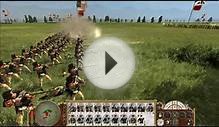
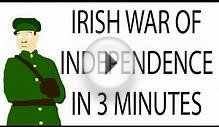
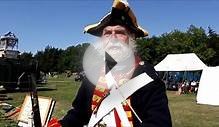

 Afro-American is an alternative to the term African American, referring to an American of African ancestry. It also can be used as an umbrella term to refer to all descendants of Africans slaves to the Americas during the Atlantic slave trade. The term had gained...
Afro-American is an alternative to the term African American, referring to an American of African ancestry. It also can be used as an umbrella term to refer to all descendants of Africans slaves to the Americas during the Atlantic slave trade. The term had gained...








